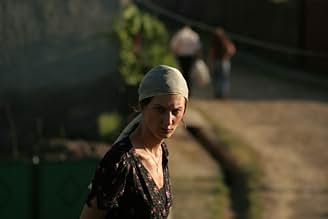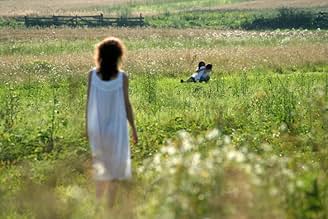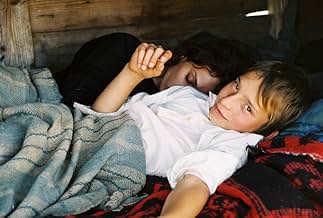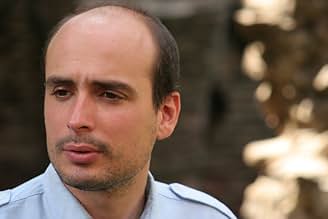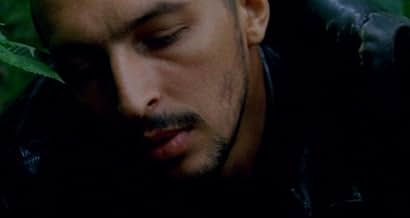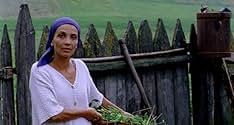Katalin Varga
- 2009
- Tous publics
- 1h 22min
NOTE IMDb
7,0/10
3,2 k
MA NOTE
Ajouter une intrigue dans votre langueKatalin, a woman raped in the Carpathian Mountains, seeks revenge with a boy, questioning morality's complexities as she confronts her past.Katalin, a woman raped in the Carpathian Mountains, seeks revenge with a boy, questioning morality's complexities as she confronts her past.Katalin, a woman raped in the Carpathian Mountains, seeks revenge with a boy, questioning morality's complexities as she confronts her past.
- Réalisation
- Scénario
- Casting principal
- Récompenses
- 14 victoires et 16 nominations au total
Tibor Pálffy
- Antal Borlan
- (as Tibor Pálfy)
Avis à la une
I enjoyed Peter Strickland's 'Berberian Sound Studio' from 2012, and this film made by him 3 years earlier is just as good, if not better. It has a strange tone - almost like a 1970s Agnes Varda film, but it's set in Romania in present day. It's extremely erie in places and very beautifully shot in the Carpathian mountains about a woman with nothing left to lose out for vengeance. It also features a superb (but disturbing) monologue midway through the film from lead actress Hilda Peter.
I borrowed the DVD from a local store, being sure that this is going to be a good movie. I read good reviews of it. Now I'm quite disappointed after seeing it. The movie is good enough until the scene where the woman is telling her rape experience finishes. The story of the rape is the best part. As the camera focused on the characters' faces, Katalin tells her horrific story, disconnected from the suffering that we would expect. That gives the character a lot of power. She is in a position of control, she overcame the bad experience and her main weapon is the truth, because the truth will really ruin the precious relationship of Katalin's aggressor with his wife. The story of the rape is told in such intimate detail, that you may feel various emotions, like empathy, justice being done, concern for any of the characters, each of them may be in a dangerous position. The situation is very much like one from Sadoveanu's novel "Baltagul". After this wonderful artistic moment, the rest of the movie is full of broken links. The man's regret for what he has done is very unrealistic, not that this might not happen in real life, but his state is not supported by the play and the character's story. Then, the suffering for the loss of his wife is too short. The wife, a devoted Christian, commits suicide (that's possible, but not very probable) without many explanations given to us. The man suffers too little after that because he is quite preoccupied with his relation with Katalin and her son. Many other disharmonious details disconnected me from the movie. I also have some personal regrets, that the Romanians in the movie are all mean characters. There's no obvious reason in a movie where 99 percent of the time you have Hungarian language speaking, only three short but significant dialogues are in Romanian. In one of them we have the girls eating sunflower seeds that are not helping the strangers in need without judging or mocking them. Eating sunflowers in public in Romania is associated with low class, specially because it's a Balkan habit mostly associated with gypsies. Speaking of gypsies, I can not get over the idea that the first victim of Katalin is associated with Gypsies and undoubtedly this is part of the construction of an evil character. The other two scenes with Romanians are the ones involving the vengeful criminals, one of them showing a twisted faith in God. Anyway, it could have been a good movie, but amateurish errors and a bit of xenophobia (I suppose) ruined it for me. I may keep in mind as good parts: landscapes, music and the boat scene.
The beautiful Transylvanian countryside, where a thin veil of modernity covers a continuing peasant lifestyle for many, is the setting for Peter Strickland's short, unsentimental film 'Katalin Varga' about the aftermath of a rape. It's a quiet movie, strikingly shot, that offers no pretence of life easier than it actually is. To me, it seemed that the reaction of the perpetrator's wife seemed simultaneously slightly overdone (in terms of motivation) and underplayed; one might also suggest that the ending is not especially satisfying, probably because the film never lets us know exactly what it is that Katalin is hoping for. This can be justified, however, because it's completely plausible that the character doesn't know herself. In a nutshell, this is a revenge movie; but so much more interesting that most of what we see in this genre.
Peter Strickland's debut movie Katalin Varga reminds me very much of another recent British film, Asif Kapadia's 2007 effort Far North, which is also a folk horror story about an outcast and her child. Stickland uses the dank forest of Romania instead of the perilous ice flows of the north, but the movies are birds of a feather, low budget movies intended to tap primal energies.
Children run away from Katalin Varga, a darkly pretty woman with live-wire eyes, who's altogether too spirited to remain unmolested in the time-capsuled world with which the movie presents te viewer. Folk have mobile phones, but Katalin still travels by horse-drawn cart, and men still make hay in the fields with pitchforks. Gossip in Katalin's village is poisonous enough to make Clouzot's vision in Le Corbeau appear positively made of marshmallow. Following the repurcussions of gossip regarding Katalin's past, she travels with her child into an apparently infrastructure-less hinterland on a dark mission, like black lightning.
It's no surprise to find, following shot after shot of foreboding nature scenes, that this is a tragedy, in a cul-de-sac structure similar to Monte Hellman's brilliant 1965 movie Ride in the Whirlwind.
It's a brutal movie, in structure rather than in screen violence, which there is remarkably little of, and which is generally obscured in incoherence when it occurs. It's almost senseless and left me with a directionless primitive anger.
Children run away from Katalin Varga, a darkly pretty woman with live-wire eyes, who's altogether too spirited to remain unmolested in the time-capsuled world with which the movie presents te viewer. Folk have mobile phones, but Katalin still travels by horse-drawn cart, and men still make hay in the fields with pitchforks. Gossip in Katalin's village is poisonous enough to make Clouzot's vision in Le Corbeau appear positively made of marshmallow. Following the repurcussions of gossip regarding Katalin's past, she travels with her child into an apparently infrastructure-less hinterland on a dark mission, like black lightning.
It's no surprise to find, following shot after shot of foreboding nature scenes, that this is a tragedy, in a cul-de-sac structure similar to Monte Hellman's brilliant 1965 movie Ride in the Whirlwind.
It's a brutal movie, in structure rather than in screen violence, which there is remarkably little of, and which is generally obscured in incoherence when it occurs. It's almost senseless and left me with a directionless primitive anger.
When the husband of the eponymous Katalin Varga learns that he is not the father of their ten year old son, Orban, he throws her out and demands that she leaves their village. She departs with Orban, telling him that they are going to see his sick grandmother. She has other plans though; Orban wasn't the result of an infidelity but of rape and now she intends to have her revenge. This is something that will have unintended consequences and put her in danger.
Usually when revenge is the subject of a film there will be lots of action before a righteous avenger slays the villainous character who wronged them. This is very different; there is little in the way of action but that is more than made up for in atmosphere. The rural Romanian setting is beautiful and in turns idyllic and oppressive depending on the location and even the weather. This is a world where ancient meets modern; Katalin travels in a horse drawn cart but characters have mobile phones. Hilda Péter does a great job as Katalin, a character who is rarely off screen; the scene where she talks about what happened to her is particularly effecting. The supporting cast are solid too; most notably Tibor Pálffy who plays the man she most wants revenge against... a character that is more sympathetic than one might expect. Overall I'd definitely recommend the melancholically beautiful film.
Usually when revenge is the subject of a film there will be lots of action before a righteous avenger slays the villainous character who wronged them. This is very different; there is little in the way of action but that is more than made up for in atmosphere. The rural Romanian setting is beautiful and in turns idyllic and oppressive depending on the location and even the weather. This is a world where ancient meets modern; Katalin travels in a horse drawn cart but characters have mobile phones. Hilda Péter does a great job as Katalin, a character who is rarely off screen; the scene where she talks about what happened to her is particularly effecting. The supporting cast are solid too; most notably Tibor Pálffy who plays the man she most wants revenge against... a character that is more sympathetic than one might expect. Overall I'd definitely recommend the melancholically beautiful film.
Le saviez-vous
- AnecdotesThe film was shot in Romania in July 2006 for around £25,000 with a small crew of 11 people (including transport and catering). Strickland paid everyone on the 17-days-shoot himself, apart from the focus-puller, who agreed to work for free. The whole crew and the actors lived together in an empty house in a small village in the Carpathian Mountains. After the shoot Strickland ran out of money while editing. He approached many UK production companies, but the reaction was always negative because an obscure film by an unknown director, not even in the English language, seemed to put off all UK investors. Only two Romanian producers, Oana Giurgiu and Tudor Giurgiu, paid attention. They saw Strickland's rough cut and came on board as co-producers, providing the funds to make a proper sound-mix and a blow-up from the Super-16mm negatives to 35mm. It was then invited and shown in competition at the '59th Berlin International Film Festival' in 2009 and won the 'Outstanding Artistic Contribution' award for the creative sound design. Without the Romanian producers, the film would never have been properly finished.
- ConnexionsReferenced in Cowboy (2017)
- Bandes originalesThe Grave and Beautiful Name of Sadness
- excerpts taken from "The Sadness of Thing"
Written by Steven Stapleton and David Tibet
Performed by Steven Stapleton and Geoff Cox
Meilleurs choix
Connectez-vous pour évaluer et suivre la liste de favoris afin de recevoir des recommandations personnalisées
- How long is Katalin Varga?Alimenté par Alexa
Détails
- Date de sortie
- Pays d’origine
- Site officiel
- Langues
- Aussi connu sous le nom de
- 卡塔琳的秘密
- Lieux de tournage
- Sociétés de production
- Voir plus de crédits d'entreprise sur IMDbPro
Box-office
- Montant brut mondial
- 28 399 $US
- Durée1 heure 22 minutes
- Couleur
- Mixage
- Rapport de forme
- 1.85 : 1
Contribuer à cette page
Suggérer une modification ou ajouter du contenu manquant



